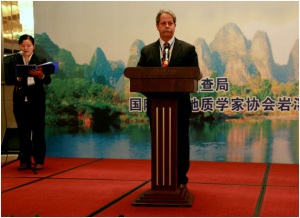WKU News
WKU geoscientist presents lecture at karst water conference in China
- Friday, April 19th, 2013
WKU Distinguished Professor Chris Groves returned from Guilin, China, this week where he gave an invited keynote lecture at the International Symposium on Karst Water under Global Change Pressure.

As an invited representative of the United Nations International Geoscience Program, Dr. Chris Groves addresses the conference opening ceremony with remarks about the status of China/U.S. cooperation in karst science. (Photo by Su Luxuan).
The conference, sponsored by the United Nations Educational Cultural and Scientific Organization (UNESCO) and the China Geological Survey, attracted 138 scientists and students from 13 countries. The meeting was held at UNESCO’s International Research Center on Karst, with support of the Institute of Karst Geology and Ministry of Land and Resources.
The conference highlighted international efforts to understand how climate change may be impacting water resources from karst aquifers. These aquifers have been estimated to supply one-fourth of the world’s population with drinking water. Karst areas like those in southcentral Kentucky are landscapes developed on soluble rock such as limestone where caves, sinkholes and underground rivers are common. There are often difficult water access and quality challenges in these regions.
Dr. Groves discussed perspectives on how water planners in the United States are factoring karst-related geological processes into strategies for climate change adaption. He concluded that, so far, the U.S. is fortunate to have a geography and climate such that there are relatively few people relying directly on karst aquifers, with notable exceptions in Texas and Florida.
In another session, Dr. Groves reported on progress in cooperative U.S./Chinese research, funded jointly by WKU’s Research and Creative Activity Program (RCAP) and the government of China’s Guangxi Province, which is trying to better quantify the removal of CO2 gas from the atmosphere that accompanies karst landscape evolution. Two sister monitoring sites are serving as reference sites for an eventual global network of such measurement stations: one is in China and the other at Lost River Cave in Bowling Green.
Geography and Geology Department Head David Keeling, noted that “Dr. Groves’ ongoing work in China is part of the Hoffman Institute’s international strategies to engage students, faculty and communities in conversations and research about critical water resource issues. From China to Belize, the Caribbean to Europe, and to points across the U.S., Dr. Groves’ team is focusing new technologies and techniques on this planet’s most precious natural resource: water.”
Contact: Chris Groves, (270) 745-5974.
Some of the links on this page may require additional software to view.

